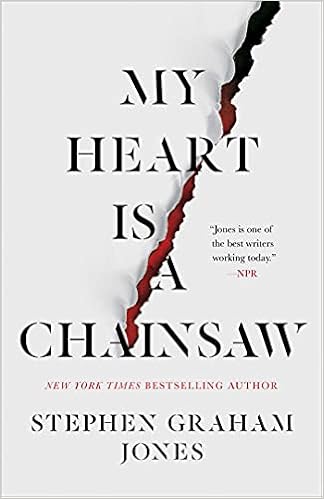At some point this final girl has to realize that this is all about her, don't you think? That her friends and family and pets would all still be alive if this slasher had only STARTED with her instead of cutting his way closer and closer to her. So she feels guilty like maybe she's sort of the killer herself, like this bodycount is maybe HER bodycount.
What I'm saying here, sir, is that she's been groomed to become her secret and best self.
Jade Daniels is the biggest horror movie fan in all of Proofrock, Idaho. She's seen them all, from classics to modern takes to the obscure stuff you find in the bargain bin at the mall. She talks about nothing else, and that might be one of the reasons she doesn't have any friends. When unexplained killings begin to occur in Proofrock--first, a bunch of elk, and then a pair of Dutch tourists in the local lake--she decides that a "slasher" has begun, and it's her knowledge of the genre that makes her the only one who can see it.
At first, it seems like My Heart is a Chainsaw is about a traumatized girl who relies on a worldview derived from movies to keep the world sensible. There is a kind of poignancy to that idea: These movies have narratives of vengeance, of moral cause and effect, which promise that abusers--like Jade's neglectful father, perhaps--receive a taste of their own medicine tenfold. And they offer easily categorized labels of identity: the "Crazy Ralph" whom no one believes, the "final girl" who survives and defeats the slasher because she is the purest of heart. But in the end--spoiler alert--Jade's intuition proves to be correct; there is an evil force at work in Proofrock, and it's soon racking up a tremendous bodycount.
But Jade is mistaken about her role in the slasher to come. She latches onto a beautiful new student, Letha Mondragon, whose father is a tech mogul remaking the other side of the lake into a resort for millionaires. Letha's beauty and compassion convince Jade that she is the "final girl," and she devises a plan to train her for the coming onslaught by educating her in the patterns of horror movies. (That Letha is black, and horror movies are notoriously stingy about keeping black characters alive, seems to be a pattern that doesn't interest Jade or the novel in any serious way.) But when the climax of the movie/novel comes, it's of course Jade--not pure, not virginal, not popular or well-loved--who must "become her secret and best self."
I read Stephen Graham Jones' Ledfeather a couple years ago, a novel that I felt had a lot of quality writing and great ideas, but which was a little muddied and imbalanced. I had been looking forward to reading another of his books, hoping that the qualities that I admired so much would remain, and not the flaws, but I think the reverse is true: I actually feel bad about how much I disliked this book. For one, I didn't really like the slangy movie-teen voice, which works in the small doses of the interstitial "extra credit" papers Jade writes for her beloved history teacher about her slasher theories, but which is incredibly grating over 400 pages of third-person narrative. (One quick example: watching someone slide down a roof, she describes them as "Jesse Pinkmaning" down it. Blech.)
But mostly, the whole thing was just incredibly convoluted. From the beginning, we're told that Proofrock has three or four different creepy legends, including a "Lake Witch," a town that was drowned when the lake was dammed, and an old-time preacher who, I don't know, haunts them or something? Add to that several instances of remote trauma, like the murder of the sheriff's daughter before Jade was born. I couldn't keep any of it straight. There are maybe three dozen characters, most of them questionably necessary. The final 100 pages, in which Jade's premonition that Proofrock's July 4th celebration will be the slasher's bloody climax, are so intricately plotted I could not begin to summarize them.
If My Heart is a Chainsaw were a movie, it might have worked. We would have had visual cues that led us across the scene, from Jade's perspective in the water, to her father in a boat, to her love interest selflessly saving some children, to the suspected slasher creeping up with a machete, to Letha in a swan boat, to the ignorant townspeople about to get their jaws ripped off. But a book is not a movie. And that really explains much of why this book falls flat: it badly wants to be the kind of movie that Jade loves. But the jump scares don't jump or scare; the rush of escape leaves the reader behind; and Jade's constant interpolation, by which she filters everything that happens through her compendious slasher knowledge, totally deflects the kinds of emotions a real movie might inspire, like shock or fear. It doesn't work; it's just a mess. If you want to watch a slasher movie that's meta about its own structures, just go watch Scream instead.


No comments:
Post a Comment